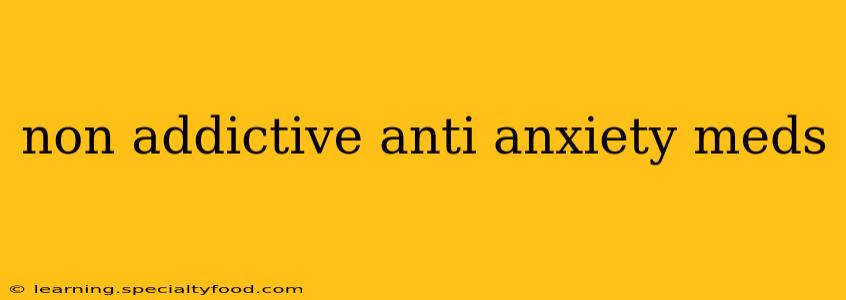Anxiety disorders affect millions, leading many to seek relief through medication. However, the fear of addiction often accompanies this search. This guide explores non-addictive options for managing anxiety, emphasizing the importance of consulting a healthcare professional for personalized treatment. It's crucial to remember that while these medications are less prone to addiction than some others, they can still have side effects and should be taken under medical supervision.
What are Non-Addictive Anti-Anxiety Medications?
The term "non-addictive" is relative. No medication is entirely devoid of the potential for dependence or misuse, but some carry a significantly lower risk than others, particularly benzodiazepines. Non-addictive anti-anxiety medications generally fall into categories less associated with physical dependence and withdrawal symptoms. These typically include certain antidepressants and other classes of drugs used off-label for anxiety management.
What are the Different Types of Non-Addictive Anti-Anxiety Medications?
Several medication classes offer anxiety relief with a lower addiction potential:
1. Selective Serotonin Reuptake Inhibitors (SSRIs)
SSRIs, like sertraline (Zoloft), paroxetine (Paxil), escitalopram (Lexapro), fluoxetine (Prozac), and citalopram (Celexa), are widely used antidepressants also effective for anxiety. They work by increasing serotonin levels in the brain, a neurotransmitter impacting mood and anxiety. While not addictive in the same way as benzodiazepines, SSRIs can cause withdrawal symptoms if stopped abruptly, highlighting the need for gradual tapering under medical guidance.
2. Serotonin-Norepinephrine Reuptake Inhibitors (SNRIs)
SNRIs, such as venlafaxine (Effexor) and duloxetine (Cymbalta), increase both serotonin and norepinephrine levels. Similar to SSRIs, they are not considered addictive but require careful discontinuation to avoid withdrawal. These are often prescribed for anxiety disorders accompanied by depression.
3. Buspirone (Buspar)
Buspirone is a unique anxiolytic that doesn't belong to the benzodiazepine family. It works differently than SSRIs and SNRIs, impacting serotonin and dopamine receptors. It is generally considered non-addictive, but it can take several weeks to become fully effective.
4. Beta-Blockers
While primarily used to treat high blood pressure and heart conditions, beta-blockers, such as propranolol, can also help manage the physical symptoms of anxiety, such as rapid heartbeat and trembling. They don't address the underlying anxiety but can be helpful in specific situations, like public speaking or performance anxiety. They are generally not considered addictive.
How Long Does it Take for Non-Addictive Anti-Anxiety Meds to Work?
The onset of action varies significantly depending on the medication and individual factors. SSRIs and SNRIs often require several weeks to reach their full therapeutic effect. Buspirone can also take several weeks to become fully effective. Beta-blockers provide faster relief for physical symptoms but don't address the underlying anxiety.
What are the Side Effects of Non-Addictive Anti-Anxiety Medications?
Side effects are possible with all medications. Common side effects of SSRIs and SNRIs can include nausea, headache, insomnia, sexual dysfunction, and weight changes. Buspirone side effects may include dizziness, nausea, and headache. Beta-blockers can cause fatigue, dizziness, and low blood pressure. It's crucial to discuss potential side effects with your doctor.
Are There Any Natural Alternatives to Non-Addictive Anti-Anxiety Medications?
Lifestyle changes and complementary therapies can complement medication or serve as primary treatment options for some individuals. These include:
- Cognitive Behavioral Therapy (CBT): A highly effective therapy that helps identify and change negative thought patterns and behaviors contributing to anxiety.
- Mindfulness and Meditation: Practices that promote relaxation and self-awareness.
- Exercise: Regular physical activity releases endorphins, improving mood and reducing stress.
- Dietary changes: Focusing on a balanced diet and limiting caffeine and alcohol consumption.
- Sufficient Sleep: Aiming for 7-9 hours of quality sleep per night.
When Should I Consult a Doctor About Anxiety?
If anxiety significantly impacts your daily life, interfering with work, relationships, or overall well-being, it's essential to seek professional help. A doctor can provide a proper diagnosis, discuss treatment options, including medication and therapy, and monitor your progress. Self-treating anxiety can be dangerous, and professional guidance is crucial for optimal outcomes.
Disclaimer: This information is for educational purposes only and is not intended as medical advice. Always consult with a healthcare professional before starting or stopping any medication. The content provided here should not be considered a substitute for professional medical advice, diagnosis, or treatment.
